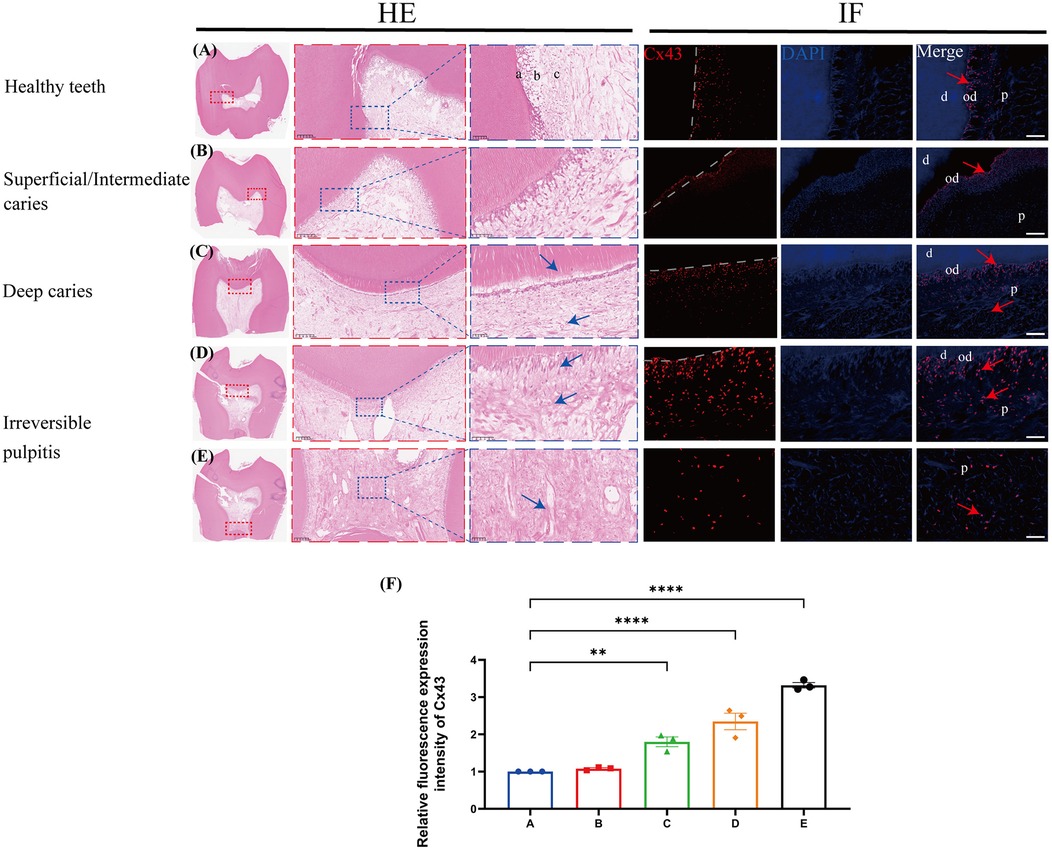- 1School of Stomatology, Southwest Medical University, Lu Zhou, China
- 2Luzhou Key Laboratory of Oral & Maxillofacial Reconstruction and Regeneration, The Affiliated Stomatological Hospital, Southwest Medical University, Luzhou, China
A Correction on
By Hu P, Long P, Li R, Lan X, He Y, Li G and Li S. Front Oral Health. 2024;5:1496819. doi: 10.3389/froh.2024.1496819
Error in figure/table
Wrong content
There was a mistake in Figure 1 as published. [1. Panel 1A inadvertently displayed an incorrect tooth specimen due to a clerical error during image compilation. We have replaced it with the validated sample, consistent with original experimental records. 2. Panel 1D was misclassified as a distinct diagnostic category, duplicating the irreversible pulpitis cohort shown in Panels 1E and 1F. This panel must be deleted to resolve grouping redundancy]. The corrected Figure 1 appears below.

Figure 1. The expression profile of Cx43 in human third molars (n = 3/group). Cx43 (red arrow) immunofluorescence staining and quantitative analysis in infected teeth and healthy controls. Blue arrows: inflammatory cells; a/od: odontoblast layer; b: cell-rich zone; c: pulp proper; d: dentin; P: dental pulp; (A) Healthy teeth; (B) Superficial/Intermediate caries; (C) Deep caries; (D,E) Irreversible pulpitis; scale bar: 20 µm; (F) Quantitative fluorescence analysis of Cx43 in various groups of dental pulp. **P < 0.01, ****P < 0.0001.
Figure/table caption
There was a mistake in the caption of Figure 1 as published. [The published caption incorrectly described Panel 1A due to inadvertent specimen misidentification and erroneously included Panel 1D as a distinct diagnostic category, duplicating the irreversible pulpitis cohort. These inaccuracies necessitated panel replacement (1A), deletion (1D), re-sequencing of subsequent panels, and comprehensive legend revision]. The corrected caption of Figure 1 appears below.
“[Figure 1. The expression profile of Cx43 in human third molars (n = 3/group). Cx43 (red arrow) immunofluorescence staining and quantitative analysis in infected teeth and healthy controls. Blue arrows: inflammatory cells; a/od: odontoblast layer; b: cell-rich zone; c: pulp proper; d: dentin; P: dental pulp; (A) Healthy teeth; (B) Superficial/Intermediate caries; (C) Deep caries; (D,E) Irreversible pulpitis; scale bar: 20 µm; (F) Quantitative fluorescence analysis of Cx43 in various groups of dental pulp. **P < 0.01, ****P < 0.0001.]”
The original version of this article has been updated.
Generative AI statement
Any alternative text (alt text) provided alongside figures in this article has been generated by Frontiers with the support of artificial intelligence and reasonable efforts have been made to ensure accuracy, including review by the authors wherever possible. If you identify any issues, please contact us.
Publisher's note
All claims expressed in this article are solely those of the authors and do not necessarily represent those of their affiliated organizations, or those of the publisher, the editors and the reviewers. Any product that may be evaluated in this article, or claim that may be made by its manufacturer, is not guaranteed or endorsed by the publisher.
Keywords: deep caries, connexin43 hemichannel, inflammatory response, dental pulp cells, DAMPs
Citation: Hu P, Long P, Li R, Lan X, He Y, Li G and Li S (2025) Correction: Blockade of connexin43-containing hemichannel attenuates the LPS-induced inflammatory response in human dental pulp cells by inhibiting the extracellular flux of ATP and HMGB1. Front. Oral Health 6:1687229. doi: 10.3389/froh.2025.1687229
Received: 17 August 2025; Accepted: 26 September 2025;
Published: 8 October 2025.
Edited by:
Georgios N. Belibasakis, Karolinska Institutet (KI), SwedenReviewed by:
Juan Saez, Universidad de Valparaiso, ChileCopyright: © 2025 Hu, Long, Li, Lan, He, Li and Li. This is an open-access article distributed under the terms of the Creative Commons Attribution License (CC BY). The use, distribution or reproduction in other forums is permitted, provided the original author(s) and the copyright owner(s) are credited and that the original publication in this journal is cited, in accordance with accepted academic practice. No use, distribution or reproduction is permitted which does not comply with these terms.
*Correspondence: Shiting Li, dGluZ3RpbmdoaWdoQHNpbmEuY29t; Guangwen Li, bGlndWFuZ3dlbkBzd211LmVkdS5jbg==
†These authors have contributed equally to this work and share first authorship
 Peiling Hu
Peiling Hu Ping Long1,†
Ping Long1,† Xiaorong Lan
Xiaorong Lan Yuanpei He
Yuanpei He Guangwen Li
Guangwen Li Shiting Li
Shiting Li